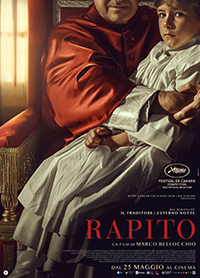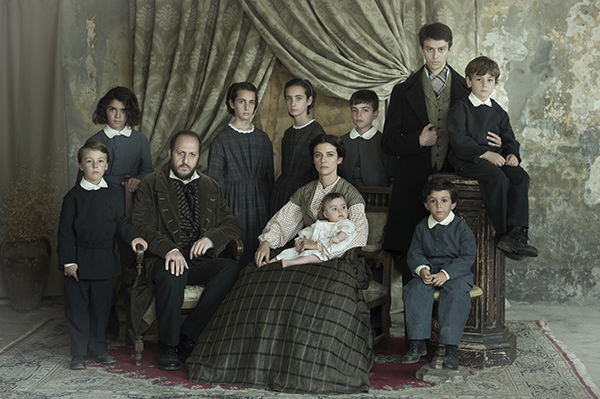A Soul to Take: Bellocchio Deliriously Dissects a Papal Delictum
 Marco Bellocchio has lost none of his flair nor his energetic zest in his latest offering, Kidnapped, a historical melodrama co-written by Susanna Nicchiarelli and Edoardo Albinati. Detailing the 1857 kidnapping of a six-year-old Jewish boy by the Catholic Church because he’d purportedly been baptized, therefore meaning he couldn’t legally be raised by his own parents, Bellocchio takes a bombastic approach to the material, which sometimes lends the film a ludicrous sheen. However, the situation itself seems so egregiously unethical in the present day this proves to be a highly satisfying approach to navigating the material, riding a knowing line between the outrageousness of the Catholic Church’s actions while keeping intact the frustration and despair brought upon the child’s parents. Highly enjoyable because of and not despite its over-the-top emotional flair, Bellocchio’s offering is exceptionally energetic and exposes a strange chapter of the papacy’s malfeasance.
Marco Bellocchio has lost none of his flair nor his energetic zest in his latest offering, Kidnapped, a historical melodrama co-written by Susanna Nicchiarelli and Edoardo Albinati. Detailing the 1857 kidnapping of a six-year-old Jewish boy by the Catholic Church because he’d purportedly been baptized, therefore meaning he couldn’t legally be raised by his own parents, Bellocchio takes a bombastic approach to the material, which sometimes lends the film a ludicrous sheen. However, the situation itself seems so egregiously unethical in the present day this proves to be a highly satisfying approach to navigating the material, riding a knowing line between the outrageousness of the Catholic Church’s actions while keeping intact the frustration and despair brought upon the child’s parents. Highly enjoyable because of and not despite its over-the-top emotional flair, Bellocchio’s offering is exceptionally energetic and exposes a strange chapter of the papacy’s malfeasance.
In 1857 Bologna, a six-year-old boy, Edgardo Mortata, was seized from his Jewish parents by the police of the papal states. Pope Piu IX (Paolo Pierobon) has been informed the boy was baptized six years prior by a Christian woman who worked for the Mortata family. She claimed to have been worried for the sick infant’s soul, performing the baptism in secrecy. At the time, Jewish parents were not allowed to raise Christian children, and the baptism effectively converted the child. As the Mortata’s struggle to regain their child, causing enough public outrage for a trial, Edgardo is meanwhile indoctrinated in his newly determined religion. The Pope goes so far as to have the child baptized again, ensuring there are witnesses, as none had seen the maid perform the ritual years prior. Some squabbling about a baptism not being allowed twice, proving the church’s deception, is also quelled by an explanation of their actions being merely for show, as if it wasn’t an official baptism. Years pass, and Edgardo grows into a favored apt pupil of the Pope. Upon the Pope’s death, Edgardo has an opportunity to return.

Now in his eighties, Bellocchio is as perennial as ever, flitting between genres, periods, and themes since his 1965 breakout Fists in the Pockets. He quite often returns to period pieces, both historical reenactments as well as the adaptations of classic literature, from Chekov, Pirandello, and Kleist. So when Bellocchio chooses to be ostentatious, it is with a definite purpose. Kidnapped unveils itself in a near constant state of heightened duress, and never quite lets this dissipate in a scenario which might seem silly (and easy to dismiss) by today’s standards but contains deeper, sinister ramifications. Coalescing more effectively than his 2012’s Dormant Beauty, which has similar aims in subtexts, one imagines Bellocchio could have easily presented the film in the same vein as his straightforward 1999 melodrama, The Nanny, a Pirandello adaptation which has similar ethical ramifications for a child whose wealthy mother cannot breastfeed, necessitating the need for a peasant woman to be his wet nurse. High drama ensues, but not in the lavish, grandiose emotional vein seen here.
Bellocchio reunites with his Esterno Notte (2022) composer Fabio Massimo Capogrosso to provide the real star of this film’s agony and ecstasy, a thunderous, imposing storm of a score which overwhelms but also formidably heightens. Used in several key moments, it is the exclamation point to remind us of just how devious Pope Pius IX’s actions were. As Pius, a nearly unrecognizable Paolo Pierobon is unnerving, a mixture of Anthony Hopkins and Alfredo Castro’s vein of villainy, woken extravagantly by the film’s score when he has a nightmare of being circumcised. As the anguished Momolo Martraro, Bellocchio regular Fausto Russo Alesi finds himself engaged with a lot of screaming and hand wringing, but considering there wasn’t any optional recourse these are the methods of despair he’s limited to. The film’s intention is to reflect the juxtaposed religious convictions of both parties, and the considerable anti-semitism of the Catholic Church’s scheming to cripple the Jewish community through devious means. Edgardo essentially becomes a homegrown indentured servant to the church, brainwashed by their rhetoric. If his family had converted to Catholicism, it would have made their community vulnerable to more sinister plotting.
When Kidnapped gets to Edgardo’s adulthood, events suddenly turn more provocative, a full fledged sycophant, who, with puppy-like adoration, cannot control his zeal for Pius, knocking him down during service in unabashed glee. His punishment results in having to draw three signs of the cross with his tongue on the floor. Bellocchio captures the unstated titillation inherent in these powerfully ingrained roles of master and supplicant, so much so there’s a palpable erotic charge. As an adult, Edgardo is played by newcomer Leonardo Maltese, who just made his debut as a similarly exploited teenager in Gianni Amelio’s Lord of the Ants. Lensed by Francesco Di Giacomo, who also recently worked on Esterno Notte (as well as Pietro Marcello’s Martin Eden, 2019), who casts most of this film in shadow, Bellocchio doesn’t fail to impress in deliberating the excessive, histrionic attitudes of a past distorted by a progression which makes it seem incomprehensible to reconcile.
Reviewed on May 23rd at the 2023 Cannes Film Festival – Competition. 125 Mins.
★★★/☆☆☆☆☆


